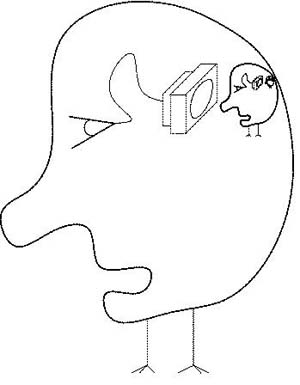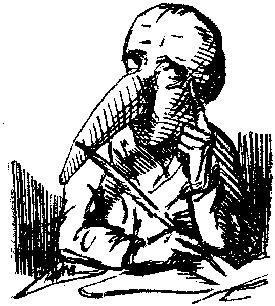June 2008
This Month's Contents: The Awareness Within by Paul Constant | Poetry by Bob Harwood | What is Love? by Thierry Vissac | Words of Wisdom | Video - Dr. Quantum Visits Flatland | Humor
Editor's Note
by Shawn Nevins
 I hope our last two issues inspired some of you to reach out to others and find
a group of friends with which to work. This month, we see truth and lies: an
essay on awareness and one on personal love, as well as Bob Harwood finding God
in an everyday moment.
I hope our last two issues inspired some of you to reach out to others and find
a group of friends with which to work. This month, we see truth and lies: an
essay on awareness and one on personal love, as well as Bob Harwood finding God
in an everyday moment.
In the midst of the swirling noise and bustle of working at a bluegrass festival yesterday, my eye was caught by the simple quiet of trees swaying in the wind. That's when we face the truth surrounding our little world of lies -- it's in the little moments between being caught by responsibilities, our quest for enjoyment and security, or our constant struggle to maintain the image of our self.
The Awareness Within, by Paul Constant
As spiritual seekers looking for our Source, most TAT Forum readers recognize or strongly suspect that we are more than simply a body. Seekers, if not most people, have the conviction or maybe a simple belief that they are something more real or profound than the lump of protoplasm seen in the mirror. The body tells us that we are hungry, but if we are fasting, the mind can override the body's repeated calls for food. If we are a marathon runner, and our muscles ache along the way, the mind's determination can overcome the body's call to stop running and rest. Thus, we may be forced to conclude that we are a "something" beyond the body that is far less tangible than the body. We find ourselves holding the belief that we are the mind, or a center of awareness located somewhere in the head, that has both the mind ("my" mind) and the body ("my" body).
In the mind, we generally find our existence as more real and alive. We identify with the mind, or our mental experience, and further identify the experience as the self or "I." We become totally involved and get carried away in what appear to be "our" thought processes and the drama of life. Very few people ever suspect or discover that a realm exists beyond the mind and mental experience.
"Mind stuff" consists of worded thoughts, thought pictures, memories, dreams, visualizations, and ultimately, our entire experience. With sufficient effort, we may be able to witness and catalog our thoughts. In Richard Rose's terminology, we can become a Process Observer. That is, we become someone who identifies -- not with the body or with the thoughts and emotions passing through the mind -- but with the awareness that is able to witness both the body and the thought processes that transpire in the mind. In essence, we become or find ourselves to be an awareness that is beyond both the body and the mundane mind as we know or conceive it.
The description of this condition pales in comparison to the sudden and stunning realization that we are watching our thought processes. Momentarily, we become an awareness that is far superior to our ordinary, day-to-day, way of being in the world. This change in perspective generally only comes after an intense period of meditation, in which we attempt to examine our thoughts as the subject matter for meditation.
Those who find themselves suddenly able to witness their thought processes may revel in this newfound ability to "be the Watcher." They may mistakenly believe that the goal is to spend more and more time watching their thoughts until they become "self-aware" throughout all their waking hours. As desirable as this condition may seem, it is only a step along the way to the discovery of our true Essence.
What is the next step? What can or should we do once we recognize thought-forms as reflections, or objects, in our field of awareness? We have found that thoughts arrive, and if we are diligent, we can witness them as they pass before our awareness. We reside in or identify with the awareness that witnesses thought. At some point, we will realize that thought is inescapable while we are in a human body. Even those who have Become, or entered into Union with the Absolute, return to a thinking mind, albeit with a vastly different perspective. Any sense of a personal self is left behind when entering the timelessness of the Absolute. Upon return to the mundane world, the mind again becomes active, and the thought processes come back to life with all their confusions, conundrums, and comparisons. Unfortunately, we have no alternative while living in this relative world of polar opposites.
 Some
people may further realize that they are aware, not only of their bodies and
thoughts, but of their awareness itself. They become aware of awareness. This is
not as simple as it sounds. On the contrary, it is an experience of some note
that happens quite suddenly if we spend much time and effort in meditation. Yet,
this realization -- this knowledge and conviction that we are aware of our
awareness -- is not the final Answer.
Some
people may further realize that they are aware, not only of their bodies and
thoughts, but of their awareness itself. They become aware of awareness. This is
not as simple as it sounds. On the contrary, it is an experience of some note
that happens quite suddenly if we spend much time and effort in meditation. Yet,
this realization -- this knowledge and conviction that we are aware of our
awareness -- is not the final Answer.
We may ultimately find that it is not even "our" awareness. The question becomes, if we are watching our thoughts, who is doing the watching? If we are aware of our awareness, who or what is the anterior awareness? A new conundrum or koan comes into play for those who have the courage and conviction to continue their internal investigations.
To recap things a bit: we become aware of a part of us that witnesses experience, including the body, the emotions, and the thoughts. Then, we become aware that we are suddenly aware of the former awareness just mentioned -- we know we are watching, and we watch ourselves watching. We then wonder: how can two separate senses of awareness exist simultaneously? Are they separate individual entities, or merely two different aspects of the same, single Source?
In the book, Psychology of the Observer, Rose offers a symbolic view of this situation along with a possible explanation or solution to the dilemma. In a diagram labeled "Jacob's Ladder," we find an arrangement of polarities in the dualistic world, between which exists a tension that might be considered elemental to all movement and life. On the second level of this diagram, we find the polarity between the (mental) Process Observer and the Individual Consciousness of Awareness mentioned above. There is an associated tension between the horns of this paradox as well, which may provide the impetus and fuel to reach yet a higher level of awareness or being.
Rose argues that the struggle to know our true Source is the farthest possible reach for the mind. In fact, after enough intensity in that struggle, the seeker will suddenly find himself or herself in a realm that is beyond the body, the mind, and any verbal description. The real goal is to know beyond a shadow of a doubt that our true definition, our true nature, is that Singular Awareness that is beyond all, and That in which we are contained. We are Awareness, and Awareness is One, all pervading, all encompassing, and all-inclusive. The mind is left behind, and the awareness that we have come to understand and identify as our "self" becomes momentarily immersed in the Nothingness that encompasses All, a Oneness that is also an infinite multiplicity of Everythingness. The individual exists no longer; the drop of water has entered the ocean.
Unavoidably, the description of the above process is an oversimplification. It is an intellectual roadmap that must be fueled by inspiration, intuition, and determination. And this path is not the only path, but perhaps one that resonates with select seekers who have a desire to know their Source and a conviction that such attainment is possible. This desire, coupled with the frustration of not knowing, is a polarity that can provide the tension energy necessary to further the effort into realms not previously considered.
A unique individual mind-body vehicle carries each person along, or so it seems. Our task is to look under every rock in the search for definition. We will never know unless we make the effort, if under the next rock, or around the next corner, lay the key or tool that will enable us to look even more clearly within ourselves and to make the next step. We will find that each discovery can provide a new method that may lead us into the more subtle realms of self-discovery. The process should and will prove itself along the way.
In Richard Rose's Albigen System, a method is described that consists of a retreat from erroneous thinking by critical examination of our beliefs and thinking processes. Yet like all tools, techniques, or methods, it can only take us so far, and at some point, we will "run out of railroad tracks," as Rose used to say. We will find that our tools and techniques are aspects of the mental realm, and as such, cannot take us beyond the mental dimension. Ultimately, all we can do at this point is to continue our retreat from…everything, until we know for sure that the awareness within us is the Final Door through which we must pass, on our way to Truth and the Absolute.
A Poem, by Bob Harwood
|
"At the Coffee Shop" When I walked into the coffee shop, I couldn't believe it. I took a deep breath, Then, I looked at the sunlight coming through the front window, I suspected that this was the only morning in the history of all time After a while, I got up my courage and walked over to God's table. Some people go to church to find God, |
What is Love?, by Thierry Vissac
A few days ago, we spoke of Love.
The recurring question is often that of the reality of personal love: "What is loving someone?"
We've gotten used to looking at what drives us from an angle which suits us so as to justify our tendencies.
So, when we speak of the couple or even of maternal love, what we're inclined to find there (or expect from it) is purity or altruism.
If we ask two individuals who are attached to one another, whether they love each other, they generally say "yes", without hesitating, but without being able to comment upon such a feeling. If we insist, we can often hear the personal effort to give a "clean" appearance to the relationship. And yet, a more candid look would shed some beneficial light on the notion of love, not to soil it but to enable greater discernment so as to recognize the Truth often hiding behind other more practical and comfortable truths.
 The
couple is a notion that has been built up by the ego. The vision of the ego
leads it to the race to fulfil the feeling of separation or the lack of unity.
Two individuals get together in the hope of filling a void. To that are added
sexual needs, always supposing they weren't the primary reason for getting
together in the first place, because being an official couple is an opportunity
for fulfilment.
The
couple is a notion that has been built up by the ego. The vision of the ego
leads it to the race to fulfil the feeling of separation or the lack of unity.
Two individuals get together in the hope of filling a void. To that are added
sexual needs, always supposing they weren't the primary reason for getting
together in the first place, because being an official couple is an opportunity
for fulfilment.
So, nobody loves anybody. We get together with someone for ourselves, even if a certain idea of morality leads us to say or think that this is a good thing for the other person. In reality, personal need is the sole driving force of both affection and the sexual act and the fact that this may satisfy the other person is completely by the way, even if it gives us a good conscience. The couple is a personal arrangement to which we've tried to give an image that is more spiritually or socially correct.
No one ever loves anyone is the ego's reality. But such a reality is unbearable and you may feel this after reading these words if you have never dared look at things this way. The love we say we experience for another person betrays a personal interest, a need which, if it's no longer satisfied, can quickly turn into hostility. We have to see that if we are to recognize what Love really is, beyond any personal arrangement and other spiritualized egocentricities. We have the right to "seek" love but it's to our advantage if we don't give ourselves replies too quickly, since these short-cuts finally take us further away from love.
Love is not an emotion. It's not linked to a person and it links us to no one. Love is the very substance of Life. We recognize the experience of Love by the fact that it reveals for us the essential Nature of Life. Love is a Communion. It's not even a feeling, even if we can translate communion in these terms. The object, situation or being we cross is the support or the target of Love, that moment when personal existence recognizes itself as being Unique and Infinite. In this case, there is no longer anyone for loving another person.
In what we commonly call "love", we find affection. Affection has a physical support which requires contact. It is nurtured by "cuddles" or "kisses". Affection is frustrated when there is less or no contact. This sensation has little to do with Love. This affection requires no judgment, it is the reality of the couple, the reality of the "little man or woman" pursuing his or her quest.
Communion doesn't require contact, even if it doesn't prohibit it either. Someone crosses our field of vision and there's a recognition of Unity, opening up of the heart, welcoming of the Presence in a new, unknown form which we celebrate within. There's no personal interest or future in this encounter which is fleeting. But recognition is eternal. What has been recognized in this fleeting encounter is not linked to it. It's not sensorial recognition. And the next object, being or situation reveals to us, in new attire, another opportunity to recognize the essential nature of Life, which is Love.
This disinterested, "unconditional" love is the only one which leads to the appropriate action vis à vis the other person. The quest for affection veils what may be transmitted or received from one to the other because there is a lack which has to be filled, an expectation. Without that, the flow is free and uninterrupted. Where there is expectation, even if this is spiritual in nature, need intervenes and separation is perpetuated.
It's not a question of ceasing all relationships but of illuminating them with the right look. We won't recognize Love if, out of fear, we strive to find it in places where it isn't present. We don't encounter truth by dressing it up as falsehood.
We accept that the couple is a personal arrangement, that the fact of receiving what we expect of it guarantees its survival and that Love is generally absent from it, unless the ego's empire in this almost impenetrable fortress ceases. Our dreams of a soul mate are resurgences of the Call of Unity which is denied by the ego's separative act, by its expectation, its exclusivity.
The intensity of a relationship is not the "proof" of Love. A passion can carry us into ecstasies and sometimes even fleeting openings but, outside of these fleeting moments that are special for "the little man or woman", expectation reclaims its rights and the potential of Communion is more often than not altered by the pressure of expectation. This is also the reason why the "beginnings" of an affective relationship are often more open, because expectation has not fully asserted itself. It's also why the ego which does not temper itself rationally, instinctively likes to change partners because he knows how relationships are weighed down by expectation (for which it itself is responsible).
Wherever the ego is, Love will be somewhere else. Wherever there is "someone", there is "another", wherever there is "another", there is an expectation to be fulfilled, a potential enemy, and Love is already far away.
We can simply recognize that we sustain ourselves with the other in the personal relationship, the affection (this is also true of a mother and her child), but we must also recognize that such sustenance is fleeting. Communion and Love tolerate physical distance because it has been Seen that the substance of Love does not reside in the "contact" with the "other" but that it can be indifferently recognized at any moment, in any person, regardless of distance, interest or lack of interest that the ego may find in it.
Love is not a relationship but Life in Unity.
This, of course, is both going too far and at the same time not far enough.
Learn more about Thierry Vissac at: istenqs.org.
Words of Wisdom
|
|
Responses from retreat participants to the challenge of writing a six-word memoir of their life: Seeking Truth was my true interest. Searching for the Truth; Do or Die. Versatile, human, seeker, futile, suffering, half-amused No words will describe my life. Precocious, open, restrained, seduced, priorities, hope War between deepest desires and hypnosis. My life seems like a football. Knowledge is transient. Trust unchanging awareness. Experience illusion, look inside, find life. |
Video: Dr. Quantum Visits Flatland
If you don't see a video clip above, then go directly to YouTube.
Humor...."I've had a perfectly wonderful evening. But this wasn't it." ~ Groucho Marx |





